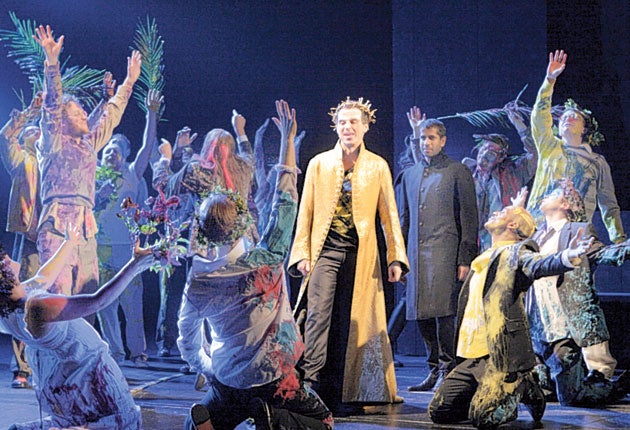Emperor and Galilean, National Theatre: London

Your support helps us to tell the story
From reproductive rights to climate change to Big Tech, The Independent is on the ground when the story is developing. Whether it's investigating the financials of Elon Musk's pro-Trump PAC or producing our latest documentary, 'The A Word', which shines a light on the American women fighting for reproductive rights, we know how important it is to parse out the facts from the messaging.
At such a critical moment in US history, we need reporters on the ground. Your donation allows us to keep sending journalists to speak to both sides of the story.
The Independent is trusted by Americans across the entire political spectrum. And unlike many other quality news outlets, we choose not to lock Americans out of our reporting and analysis with paywalls. We believe quality journalism should be available to everyone, paid for by those who can afford it.
Your support makes all the difference.Admirers of the excellent Andrew Scott (the campily baleful Moriarty in Sherlock) have the chance to feast on his talents in Emperor and Galilean, Ibsen's vast 1873 two-part drama. It here receives its much belated English premiere in a condensed and vigorous adaptation by Ben Power that reduces what would take eight hours to perform uncut to a more manageable three-and-a-half-hour marathon. Traversing Europe and the Middle East and spanning the years 351 and 363 AD, the piece is unveiled in a production by Jonathan Kent that encompasses its epic sweep and philosophical agitation with enormous technical flair and dialectical dynamism.
Scott plays Julian the Apostate who, once made Emperor, seeks to abolish Christianity and return to the old gods of polytheism. But his project backfires, rousing Christians from their torpor and reducing Julian to an intolerant autocracy even more brutal than that of his predecessor, Constantius (a chilling Nabil Shaban). We first see him as a nervy, restless 19-year-old, for whom Constantinople has become a prison. With his sorely tried acolytes in tow, he flits (almost comically) from one unsatisfactory alternative to another, until a fateful meeting with Maximus of Ephesus (played with a dark Mephistophelean eeriness by Ian McDiarmid) persuades him that it is his destiny to establish a "third kingdom" in which the conflict between paganism and Christianity, the flesh and the spirit will be transcended.
Slight of figure, with a fractious flamboyance that always feels just a nudge away from hysteria, Scott brilliantly traces Julian's degeneration from student idealism to cracked fanatic – an emperor with a crown of golden thorns leading a band of hippy followers who resemble escapees from Hair. Kent's production, which mixes business suits and togas, makes stunning use of the Olivier's drum revolve – which can create mighty gulfs handy for the war scenes and vertically layered effects that are bitingly expressive of the counter-productiveness of Julian's project, so that when he says he is ascending to the light, he looks to be descending to the charnel basement where the mystic keeps sacrificed body parts stored in bloody plastic bags.
Emperor and Galilean is a deeply ambivalent drama that perhaps ends up endorsing Christianity despite itself. But Kent savours its scepticism in a Travelex £12 production that is a credit to the enterprise of the NT.
To 10 August (020 7452 3000)
Join our commenting forum
Join thought-provoking conversations, follow other Independent readers and see their replies
Comments